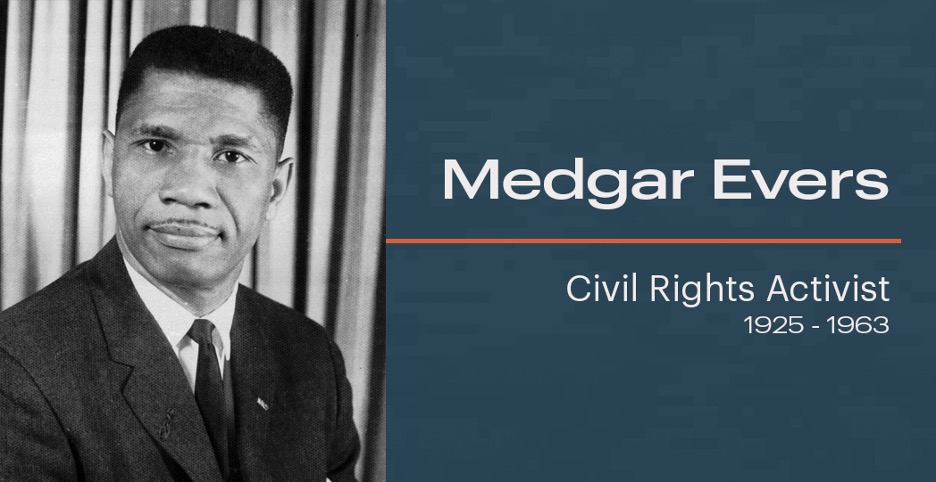Although Medgar Evers’ life was tragically cut short, the years he lived made an impact for generations. He served his country at the Battle of Normandy during World War II, but quickly realized that his service did not spare him from racism at home.
Evers' experience inspired him to take a stand in the heart of the civil rights movement in Mississippi. His work sparked major changes and inspired many others. Sadly, it also attracted attention from the Ku Klux Klan, which led to death threats and his eventual murder.
In celebration of a true hero, we share his story.
The early years
Born in 1925 into a farming family in Decatur, Mississippi, Evers grew up watching racists regularly intimidate and target Black people, even lynching a friend of his family. These horrific events inspired him to do something big with his life.
After his sophomore year of high school, in the midst of World War II, Evers followed his brother into the Army. He was sent to a segregated field battalion in England and France, earning an honorable discharge in 1946.
Some Black soldiers remained in Europe, where they could live and work with less racism than they faced in the US. But Evers was determined to return home and face the racism head on with the hope of making a difference.
He enrolled in Alcorn College after the war and, before graduating with a degree in business administration, married a fellow student, Myrlie Beasley in 1951. The couple had three children together.
Inspired to act
While Evers worked selling insurance in the Mound Bayou area, he was struck by the extreme poverty faced by many Black families in Mississippi. He joined the NAACP to help improve the lives of people in his community.
Early on, Evers worked to create local chapters of the NAACP. He was a natural at organizing a group to rally for a cause. One of his first campaigns focused on gas stations that refused to allow Black people to use their bathrooms. Evers organized a boycott and distributed bumper stickers that read, “Don’t Buy Gas Where You Can’t Use the Restroom.”
In 1954, after the Supreme Court outlawed segregation in schools with Brown v. the Board of Education, Evers applied to the University of Mississippi Law School. When his application was denied, he set his sights on fighting for desegregation. His work led to a national position as the first field secretary for the NAACP. Eight years after Evers applied to the law school, the University of Mississippi finally accepted the first African-American student, James Meredith in 1962, thanks to Evers’ efforts with the NAACP.
Evers moved to Jackson, Mississippi, and opened a regional NAACP office there. He organized several high-profile boycotts, and his wife worked alongside him. As his work continued, he drew more attention from white supremacists and received regular death threats.
Murder and injustice
The threats mounted against Evers, and his home was firebombed in early 1963. On June 11 of that year, President John F. Kennedy gave a nationally televised speech on civil rights, calling for legislation that would later become the Civil Rights Act of 1964.
Early the next day, as Evers returned home from an NAACP meeting, he was fatally shot in the back—with his wife and three children just steps away inside. He died less than an hour later. He was 37.
Just days later, the police had a suspect—Byron De La Beckwith. It appeared to be a straightforward case: Police had the rifle that was recently fired, De La Beckwith’s fingerprints were present, and there was an injury to his eye that occurred during the shooting. De La Beckwith also had been seen around the Evers’ home.
Although the prosecution presented a compelling case, this was the Deep South in the 1960s. Two trials with all-white juries were unable to reach a verdict.
De La Beckwith was a free man.
Evers’ legacy
It took 30 years, but the Evers family finally got justice. In the early 1990s, Myrlie Evers asked prosecutors to reopen the case with new evidence and witness testimony. This time, De La Beckwith was found guilty and sentenced to life in prison.
The nation lost a true hero in Medgar Evers. He was a war veteran and a devoted family man. He worked tirelessly as a civil rights leader, and his wife continued his work, later serving as chair of the National Board of Directors of the NAACP. Evers’ brother assumed the role as NAACP field secretary, and later became the mayor of Fayette, Mississippi.
Evers was buried at Arlington National Cemetery with full military honors. His life and work inspired many works of art, including songs by Bob Dylan and the 1996 film The Ghosts of Mississippi. In 1970, a college was founded in his name—the Medgar Evers College of the City University of New York in Brooklyn, New York.
Though he lived only 37 years, Evers’ passion for civil rights continues to inspire.




